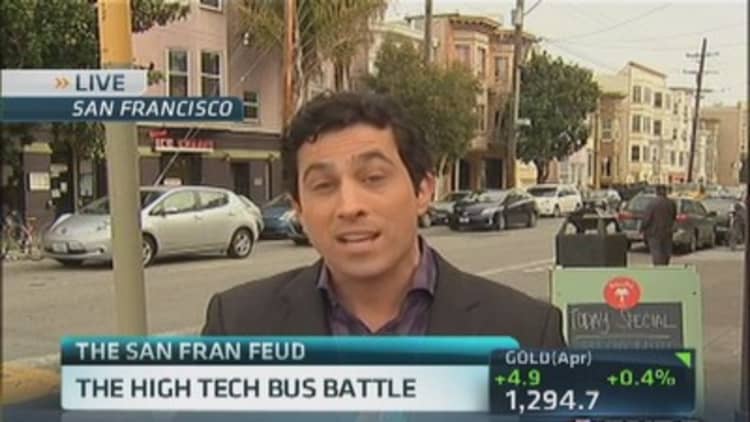
At seven in the morning, on the corner of Dolores Avenue and 18th Street in San Francisco's Noe Valley neighborhood, tech workers are quietly boarding private buses to get to their jobs in Silicon Valley.
Buses from Google and other tech companies are shuttling in every few minutes. Employees are showing up seconds before departure, some of them grabbing a coffee and pastry at the quaint Dolores Park Café. They don't want to talk, just to get on their bus and head to work.
But a few blocks away in the Tenderloin, one of San Francisco's toughest neighborhoods, Tony Robles runs San Francisco Senior and Disability, a housing advocacy group. And he is not happy about the impact tech workers are having on his city, where he has lived his entire life.
(Watch: Google buses now have security guards)
"The buses really are emblematic of this class, this privilege that people have," Robles said. "Are they too delicate to take public transportation? I take public transportation all the time. I've lived here 50 years. I've taken public transit for maybe 45 of those 50 years. I've turned out just fine."
In recent months, the Noe Valley spot and other locations around San Francisco have seen demonstrators protesting these relatively well-off employees and their effect on the city.
For their part, the Google workers at the bus stop in front of the Dolores Park Café are just trying to mind their own business and to get to work without having a problem. A recent study from the University of California, Berkeley, found that the average tech-shuttle rider is a single male about 30 with an annual salary of $100,000 or more.
The issue is surfacing at other tech hubs, including Seattle, where this week employees got a dose of what their counterparts in San Francisco have been dealing with for a while. One masked protester in Seattle held a sign that said, "Gentrification stops here."
(Watch: Google is next generation conglomerate)
The anger from community activists and housing advocates is clear. Long-time residents are upset by neighborhoods' becoming more upscale, with the corresponding rise in housing costs.
Others say surging rents and home prices are a function of supply and demand, and that increasing tech valuations and salaries are symptoms of a booming economy.
Housing prices in San Francisco are up at least 15 percent in the past year—more in certain neighborhoods—and evictions have jumped. Prices in the Mission (a traditional working-class neighborhood next to Noe Valley and convenient to the highway to Silicon Valley) have risen 30 percent in the past three years.
Members of the business community have a different perspective, and say the activists and protesters represent a small minority.
Bob Linscheid, president and CEO of the San Francisco Chamber of Commerce, said tech is a job multiplier, meaning that every well-paid engineer is supporting restaurants, retailers and a range of personal services, from yoga sessions to health clubs.
(Read more: Protesters in San Francisco form blockade around Google bus)
"Taxi drivers, people working in restaurants and in hotels are jobs created in and for San Francisco," he said. "If you want to solve unemployment, then good-paying high-tech jobs create other jobs, too."
And there is no question that San Francisco, Silicon Valley and the Bay Area are in the midst of another tech boom. But the California economy is prone to boom and bust cycles, and housing prices never go straight up without eventual corrections.
Robles said the protests that he and his group are involved with aren't about the buses but about unaffordable rents and the wave of evictions of seniors and the disabled.
(Watch: San Francisco real estate)
"That's why we're stopping the damn Google buses!" he said. "You think I'm doing this for my health? I want to go out there and stop buses? No, I don't want do that, but I'm forced to do that! And I'm forced to go out to senior residences and get them organized. And I have to see a person who has a disability get ... [evicted] and not know what's going to happen tomorrow.
Yeah, I'm mad about that. ... I'm a fifth-generation San Franciscan. I come from two communities that have been gentrified, and have been removed and displaced," Robles said, standing at the corner of Mission and Ninth Street.
—By Mark Berniker and Josh Lipton, CNBC Silicon Valley SF



